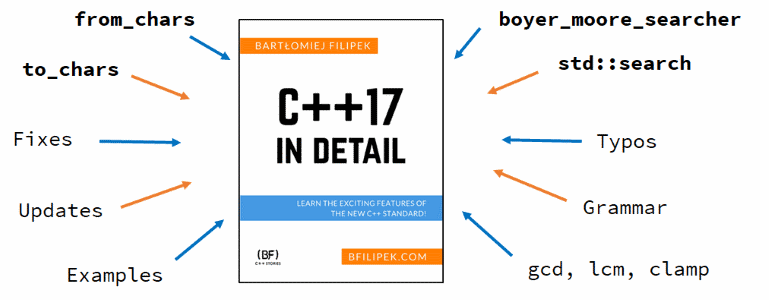Madrid C++ meetup: easy to use libs and more
New Madrid C++ meetup
Madrid C++ registration
March 11-13, Online
March 16-18, Madrid, Spain
March 23-28, Croydon, London, UK
March 30, Kortrijk, Belgium
May 4-8, Aspen, CO, USA
May 4-8, Toronto, Canada
June 8 to 13, Brno, Czechia
June 17-20, Folkestone, UK
September 12-18, Aurora, CO, USA
November 6-8, Berlin, Germany
November 16-21, Búzios, Rio De Janeiro, Brazil
By Jordi Mon Companys | Oct 23, 2018 04:28 AM | Tags: community
New Madrid C++ meetup
Madrid C++ registration
By robwirving | Oct 19, 2018 10:50 AM | Tags: None
Episode 171 of CppCast the only podcast for C++ developers by C++ developers. In this episode Rob and Jason are joined by Hana Dusíková to discuss her compile time regular expressions library, the Prague user group and her proposal for implicit constexpr.
CppCast Episode 171: Compile Time Regular Expressions with Hana Dusíková
by Rob Irving and Jason Turner
About the interviewee:
Hana is working as a senior researcher in Avast Software. Her responsibility is exploring new ideas and optimizing existing ones. She also propagates modern C++ techniques and libraries in internal techtalks and gives talks at local C++ meetups.
She studied computer science at Mendel university and subsequently taught several courses there, including: Data Structures, Computability and Complexity, and Formal Languages and Automata.
By bfilipek | Oct 19, 2018 10:43 AM | Tags: None
 The next episode of the 'most useful C++ links' is now available:
The next episode of the 'most useful C++ links' is now available:
C++ Links #7
by Bartlomiej Filipek and Wojciech Razik
From the article:
Welcome to new C++ Links - most important and useful articles, podcasts and videos that happen between 13th and 19th of October.
Today you will find links to all proposals that will be discussed in the upcoming Standard Committee meeting in San Diego, a video explaining why C++ is not an object-oriented programming language and many more!
By bfilipek | Oct 19, 2018 01:01 AM | Tags: None

C++17 In Detail Book Update!
Conversions, Searchers and C++17 In Detail Updates
by Bartlomiej Filipek
From the article:
I’m happy to announce that I updated the book! “C++17 In Detail” grew by 31 pages (up to 250), includes two new chapters and lots of “bug” fixes and better explanations.
See the 2 new chapters about low-level String Conversion Routines and Searchers.
By Ansel Sermersheim | Oct 19, 2018 12:59 AM | Tags: None
New video on the CopperSpice YouTube Channel:
What do you do when your codebase is old enough to vote?
by Barbara Geller and Ansel Sermersheim
About the video:
This video explains our perspective on the process of modernizing an old codebase. We discuss what a codebase is, what considerations you should keep in mind during the migration, and strategies to use during the migration process. We also look at which version of the C++ standard to target and why refactoring may not be a viable direction.
Please take a look and remember to subscribe!
By Blog Staff | Oct 18, 2018 02:37 PM | Tags: None
 Conferences, proposals, and learning, O my!
Conferences, proposals, and learning, O my!
C++ Annotated: June - September 2018
by Anastasia Kazakova
From the article:
... a hot C++ conference season kicked off again with CppCon. Pacific++, C++ CoreHard, Meeting C++, ADC, code::dive, and the C++ Committee meeting in San Diego, California, are coming up later this year...
... Today we are starting a new section in our regular C++ Annotated. In each issue, we will cover a selection of C++ proposals and initiatives you definitely should learn about while developing in C++. This time we unveil static exceptions, constexpr new, and lifetime checks. See details below...
By Andrey Karpov | Oct 18, 2018 04:50 AM | Tags: waf undefined behavior pvs-studio gcc devsecops devops auto
This new release included many interesting improvements related to analysis of C and C++ code, about which we'd like to tell our users.
PVS-Studio 6.26 Released
by Andrey Karpov
From the article:
A developer believes that this is a bug in the compiler. Nevertheless, it is the author of the code who is wrong. The function does not work correctly due to the fact that undefined behavior occurs in it. The compiler follows that in the
rvariable a certainsumis calculated. Overflow of thervariable must not happen. Otherwise, it is undefined behavior, which doesn't have to be considered or taken into account by a compiler. So, the compiler thinks that since the value of r variable after ending the loop cannot be negative, thenr & 0x7fffffffoperation is not needed to reset the sigh bit and the compiler just returns the value ofrvariable from the function.
By Adrien Hamelin | Oct 17, 2018 12:58 PM | Tags: community
The conclusion of this year cppcon.
Milestone | New Home | Trip Reports
by Jon Kalb
From the article:
At the formal closing of CppCon 2018, we took a moment to consider how far we’ve come in the first five years of the conference. Those years have seen us grow in so many ways. Since our first conference, we’ve added classes, field trips, author signings, exhibitor tables and booths, Tool Time, and the SG14 co-located ISO meeting. The number of main program sessions has grown by about fifty percent to almost one hundred fifty. The number of Open Content sessions has doubled to about two dozen. The number of conference days (including classes) has doubled from four and a half to nine and the number of attendees has doubled from about six hundred to over twelve hundred.
By Adrien Hamelin | Oct 17, 2018 12:53 PM | Tags: c++17
If you don't know them already.
Standard Library Algorithms: Changes and Additions in C++17
by Marc Gregoire
From the article:
The C++14 standard already contains a wealth of different kinds of algorithms. C++17 adds a couple more algorithms and updates some existing ones. This article explains what’s new and what has changed in the C++17 Standard Library...
By Adrien Hamelin | Oct 17, 2018 12:51 PM | Tags: community
A new one!
Trip report - CppCon 2018
by Jean Guegant
From the article:
New year, new conference! This time, my employer, King, helped me to organize a first pilgrimage to CppCon for me and another colleague. You cannot fathom how enthusiastic I was to finally making it there! Although I might be a bit late on the "trip-report-race", I think that it is still worth to relate my overall experience of the event and then move onto a list of recommended talks you should watch-out on Youtube...